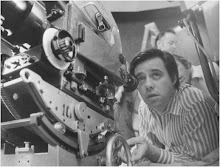This is a report I wrote for a school about the New Hollywood generation of American filmmakers. Please leave comments, questions, etc.
------------------------------------------------------------------------------
During the 1960's films seemed to have lost the interest of most audience members. With the introduction of televisions as a major form of entertainment many viewers parted from seeing films on the big screen and as a result of this, film was feared to be becoming a dead art form (it also didn't help that films were becoming more and more irrelevant each year, not saying anything new or testing the restrictions of the set cinematic language). But from the late 1960's to the early 1980's a group of young and talented film makers emerged and for a while took control over Hollywood. This group of filmmakers was referred to by the press as "The New Hollywood" - their films were personal, relevant and spoke to their audience. For the first time directors had almost complete, unquestioned controls over their films.
One of the first of these films was "Bonnie and Clyde" made in 1967, it was a project that the studio (Warner Brothers) had very little hope in. However, the makers of this film were filled with inspiration from the La Nouvelle Vague film movement taking place in France. Written by Robert Benton and David Newman (two film writers for the magazine "Esquire" with a passion for independent and foreign film, most notably the work of Jean luc Godard and Francois Truffaut) and directed by Arthur Penn, a former big league director who was blacklisted during the 50's over fear of being a communist. It starred Warren Beatty (who also produced and had more faith in the film than any other crew member) and Faye Dunaway.
The studio didn't have very much hope in the film - it was violent and they just couldn't understand why anyone would ever like it. So it was a huge surprise (perhaps even for the makers of the film) when it became a smash hit and was nominated for several Academy Awards.
Along with a little independent film called "Easy Rider" a new era was ushered in for film. One in which the artist had more control over their films than the suits. The contributors of this era were known to the public as "The New Hollywood".
Look at almost any film lover's list of favorite American films and you will see that a good deal of the films will be from the New Hollywood era. The best works of some of America's greatest directors were made in this era. To name a few of these directors: Scorsese, Bogdonavich, Ashby, Peckinpah, Altman and DePalma.
During this time, these great directors were able to flourish and make their films with little to no interference from the studios. They could do anything, with any amount of money. The director was finally the sole
author of their films. Unfortunately, this new control for the directors was ruined by two films. These films were "Star Wars" and "Jaws". Opening on thousands of screens across the country (and across the globe) these films grossed more than any other films in the history of cinema. Besides this, with Star Wars the studios were able to make countless amounts of money off merchandise like toys, books and video games bringing in huge amounts of cash. But it isn't fair to place blame entirely on the greedy studios and the filmmaker's who consider film more of a business than an art form. The directors themselves let prestige get to their heads. They thought they could do anything and they drove the studios to shut them down.
The four films that were mainly responsible for killing the New Hollywood were "Heaven's Gate", "They all Laughed", "New York New York" and "Sorcerer". "Heaven's Gate" went hugely over budget and made very little money back in the studios. "They All Laughed" was a fantastic film but after the murder of star Dorothy Stratten, nobody wanted to see it. "New York New York" was a good film but perhaps a little too personal and William Friedkin's epic "Sorcerer" opened on the same week as "Star Wars" and did no business (which was unfortunate because it was a great film).
After these films were released nothing would ever be the same for the New Hollywood directors. That's not to say that the films they subsequently made weren't good. Scorsese continued making some fantastic films, as did Ashby and Friedkin. But it was now (and still seems to be) the era of over-budgeted, unoriginal, all flash no substance blockbuster films.





